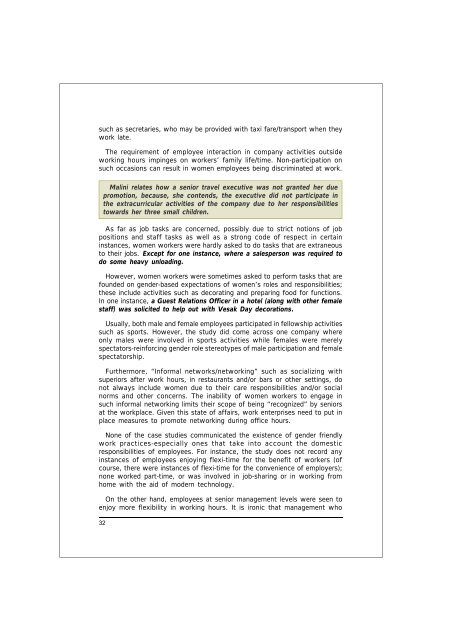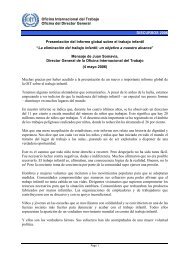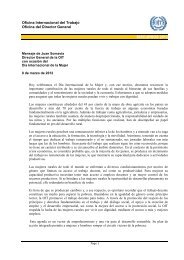Beyond Glass Ceilings and Brick Walls - International Labour ...
Beyond Glass Ceilings and Brick Walls - International Labour ...
Beyond Glass Ceilings and Brick Walls - International Labour ...
You also want an ePaper? Increase the reach of your titles
YUMPU automatically turns print PDFs into web optimized ePapers that Google loves.
such as secretaries, who may be provided with taxi fare/transport when they<br />
work late.<br />
The requirement of employee interaction in company activities outside<br />
working hours impinges on workers’ family life/time. Non-participation on<br />
such occasions can result in women employees being discriminated at work.<br />
Malini relates how a senior travel executive was not granted her due<br />
promotion, because, she contends, the executive did not participate in<br />
the extracurricular activities of the company due to her responsibilities<br />
towards her three small children.<br />
As far as job tasks are concerned, possibly due to strict notions of job<br />
positions <strong>and</strong> staff tasks as well as a strong code of respect in certain<br />
instances, women workers were hardly asked to do tasks that are extraneous<br />
to their jobs. Except for one instance, where a salesperson was required to<br />
do some heavy unloading.<br />
However, women workers were sometimes asked to perform tasks that are<br />
founded on gender-based expectations of women’s roles <strong>and</strong> responsibilities;<br />
these include activities such as decorating <strong>and</strong> preparing food for functions.<br />
In one instance, a Guest Relations Officer in a hotel (along with other female<br />
staff) was solicited to help out with Vesak Day decorations.<br />
Usually, both male <strong>and</strong> female employees participated in fellowship activities<br />
such as sports. However, the study did come across one company where<br />
only males were involved in sports activities while females were merely<br />
spectators-reinforcing gender role stereotypes of male participation <strong>and</strong> female<br />
spectatorship.<br />
Furthermore, “Informal networks/networking” such as socializing with<br />
superiors after work hours, in restaurants <strong>and</strong>/or bars or other settings, do<br />
not always include women due to their care responsibilities <strong>and</strong>/or social<br />
norms <strong>and</strong> other concerns. The inability of women workers to engage in<br />
such informal networking limits their scope of being “recognized” by seniors<br />
at the workplace. Given this state of affairs, work enterprises need to put in<br />
place measures to promote networking during office hours.<br />
None of the case studies communicated the existence of gender friendly<br />
work practices-especially ones that take into account the domestic<br />
responsibilities of employees. For instance, the study does not record any<br />
instances of employees enjoying flexi-time for the benefit of workers (of<br />
course, there were instances of flexi-time for the convenience of employers);<br />
none worked part-time, or was involved in job-sharing or in working from<br />
home with the aid of modern technology.<br />
On the other h<strong>and</strong>, employees at senior management levels were seen to<br />
enjoy more flexibility in working hours. It is ironic that management who<br />
32
















